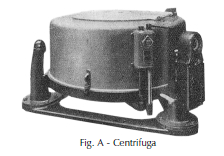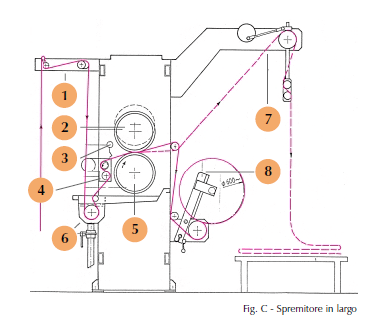© 2025 All rights reserved
Project by UsedTextilemachines.eu
Don't have an account yet? Register
Do you already have an account? Go to login Click here
Don't have an account yet? Register
Do you already have an account? Go to login Click here
Looking for the best opportunities to satisfy the customer:
Mobile Phone: +393319020189
Working hours: 09.30 / 12.30 - 16.00 / 18.00 From Monday to Friday.
Hydroextraction (which is more convenient mechanical than by heating) is practiced:
before finally drying the fabric;
in the breaks between the various wet processes, especially after washing and dyeing.
Since this is a machine that does not work continuously and involves dead times of productivity, the hydroextractor
in the basket is less and less used and replaced by the wide squeezer.
The basket hydroextractor (see figure A) is composed of:
a cylindrical stainless steel basket
(see figure B, point 1), closed at the base and perforated
in the circumference for almost the entire height.
When "loading" the basket, be careful to distribute it well
the weight to avoid dangerous imbalances.
The basket rotates on a central pin (fig. B, 2)
driven by an electric motor (fig. B, 3)
at a rate that, depending on capacity
and in diameter, it ranges from 800
at 1500 revolutions per minute.
All the rotating group
is wrapped for protection,
by a metal casing
(fig. B, 4) equipped
of lid (fig. B, 5).


The crankshaft is equipped
of friction (fig. B, 6) that
transmits speed to the basket
progressively.
The fabric, compressed by the centrifugal force against the perforated wall, loses variable percentages of water,
according to the type of fabric, from 65 to 70%.
The water comes out of the holes, collected by the casing and discharged out through a conduit (fig. B, 7).
A brake (fig. B, 8) which acts at the base of the pin stops the drum when centrifugation is complete.
Safety devices cause the power to be cut off to the motor when the door is open or opened
of the same in rotation of the basket in progress.
Compared to the hydro-extraction in the basket, this continuous processing leaves in the pieces a 10-15% of
more water but eliminates downtime and offers higher productivity, up to 30-35 meters per minute.
It is also indispensable for delicate fabrics subject to creases.
The machine is fed with fabric folded on pallets or directly from the cord opener.
The fabric passes:
by a tensioner assembly
(see figure C, point 1);
in the tray (fig. C, 6);
on a cylinder with
helical grooves
(fig. C, 4) diverging towards
the sides, which rotates in the direction
contrary to advancement
of the fabric to widen it
and smooth it out;

between two squeezing cylinders,
of which the superior
(fig. C, 2) is mobile and presses
on the underlying fixed cylinder
(fig. C, 5), securing a
perfect squeezing uniformity.
An accident prevention shelter is located before the squeezing cylinders (fig. C, 3).
When the machine stops, to avoid damage to the squeezing cylinders, a timed device unloads them
pressure automatically.
Depending on the needs, the fabric can be unloaded from the machine: on rollers (fig. C, 8)
or with flaps (fig. C, 7), since the machine usually has both unloading systems.
The operator must follow the defined machining data, according to the process card.
Adopted for all types of fabric that do not withstand the pressures of the cylinders or the action of the centrifuge.
The suction takes place along a slit on the machine on which the fabric runs wide.
Obviously this suction is very energetic to obtain a sufficient extraction of water,
which is then downloaded automatically.
After the sale of the machinery we also assist you in logistics and if desired by the customer we have technicians capable of reassembling and starting the machinery.
© 2025 All rights reserved
Project by UsedTextilemachines.eu
| Cookie | Duration | Description |
|---|---|---|
| cookielawinfo-checkbox-analytics | 11 months | This cookie is set by GDPR Cookie Consent plugin. The cookie is used to store the user consent for the cookies in the category "Analytics". |
| cookielawinfo-checkbox-functional | 11 months | The cookie is set by GDPR cookie consent to record the user consent for the cookies in the category "Functional". |
| cookielawinfo-checkbox-necessary | 11 months | This cookie is set by GDPR Cookie Consent plugin. The cookies is used to store the user consent for the cookies in the category "Necessary". |
| cookielawinfo-checkbox-others | 11 months | This cookie is set by GDPR Cookie Consent plugin. The cookie is used to store the user consent for the cookies in the category "Other. |
| cookielawinfo-checkbox-performance | 11 months | This cookie is set by GDPR Cookie Consent plugin. The cookie is used to store the user consent for the cookies in the category "Performance". |
| viewed_cookie_policy | 11 months | The cookie is set by the GDPR Cookie Consent plugin and is used to store whether or not user has consented to the use of cookies. It does not store any personal data. |
Fill out the form to contact me